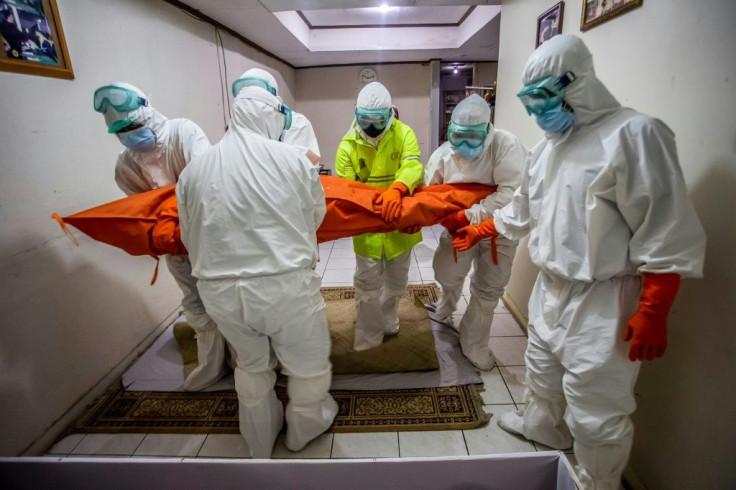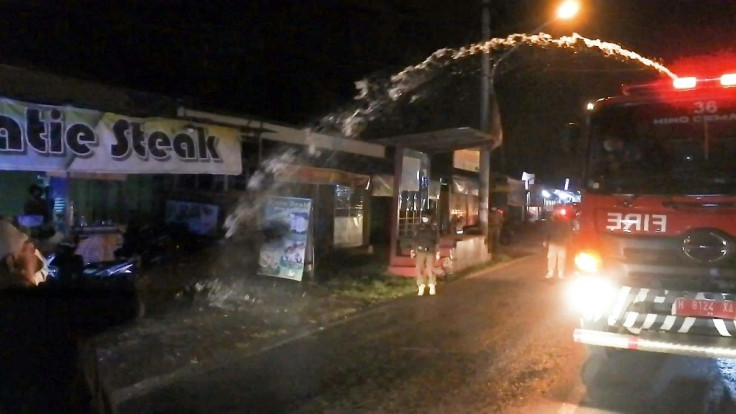Indonesia Expands Nationwide Covid-19 Curbs
Indonesia expanded nationwide curbs Wednesday to battle its deadliest Covid-19 wave yet, as the daily death toll rocketed past 1,000 and the government warned the worst may be yet to come.
The new restrictions will apply to dozens of cities and extend from Sumatra island in the west to easternmost Papua, as the highly infectious Delta variant rips across the Southeast Asian archipelago.
Many overwhelmed hospitals are refusing new patients, leaving scores to die at home, while cemetery workers race to bury the soaring number of bodies.
Offices, mosques, parks, shopping malls and restaurants have been shuttered across the hard-hit capital Jakarta and main island of Java as well as holiday hotspot Bali under new curbs that started from the weekend.
But there are widespread reports of violations including offices and shops still operating despite shutdown orders.
The world's fourth most populous nation on Wednesday reported a record 34,379 new infections and 1,040 deaths -- as much as 10 times the daily mortality rate less than a month ago.

The wider restrictions announced Wednesday include forcing the majority of non-essential employees to work from home, as well as limiting shop and restaurant hours.
The regions affected have much lower daily case counts than Covid epicentre Java, but healthcare services in those regions are already under strain and an explosion in infections could bring them to their knees, said senior minister Airlangga Hartarto.
Experts questioned why the new restrictions were not uniformly tough across the 5,100 kilometre (3,170 mile) long archipelago of nearly 270 million people.
"The virus doesn't discriminate -- it's not less deadly outside of Bali and Java so the response should be the same," said Windhu Purnomo, an epidemiologist at Airlangga University.
At a cemetery near Jakarta, staff clad in protective gear raced to bury plastic-wrapped coffins as ambulances waited in a queue to deliver the dead.
"I'm very scared about getting infected," said Nesan Nusmana, who lives near the cemetery.

"But it can't be helped. This is where I live. All I can do now is pray."
Management at Kalibata City, one of Jakarta's biggest apartment complexes, warned tenants to stay inside their units and signs were slapped on the doors of virus-infected patients isolating at home.
"I didn't want to go to the hospital not only because they're overwhelmed but I was also scared about being exposed to more of the virus," said Jessica Sihotang, a 32-year-old resident recuperating from the illness.
"But I have so much anxiety watching all this scary news about people dying in self-isolation."
Indonesia's caseload stood Wednesday at more than 2.37 million with 62,908 deaths, but those figures are widely thought to be a severe undercount due to low testing and poor tracing.
On Tuesday, the government warned it was bracing for a scenario that could see cases soar to more than 50,000 a day, as emergency oxygen supplies flowed in from neighbouring Singapore.
In the hardest-hit areas, desperate relatives have been forced to hunt for oxygen tanks to treat the sick and dying at home.
More than a dozen facilities in Indonesia's second-biggest city Surabaya have shut out new patients because they could no longer handle the huge influx.
Doctors and other medical workers are increasingly getting infected and taken out of rotation, heaping more pressure on healthcare facilities already at bursting point.
Nearly 1,000 Indonesian medical workers have died of Covid-19, including more than a dozen who were already fully inoculated, according to the country's medical association.
Australia said Wednesday it would send emergency medical equipment and about 2.5 million AstraZeneca vaccine doses to Indonesia.
© Copyright AFP 2024. All rights reserved.





















